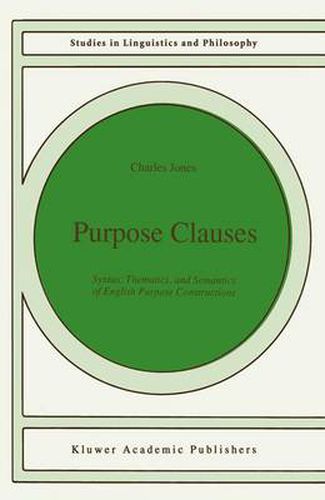Readings Newsletter
Become a Readings Member to make your shopping experience even easier.
Sign in or sign up for free!
You’re not far away from qualifying for FREE standard shipping within Australia
You’ve qualified for FREE standard shipping within Australia
The cart is loading…






This title is printed to order. This book may have been self-published. If so, we cannot guarantee the quality of the content. In the main most books will have gone through the editing process however some may not. We therefore suggest that you be aware of this before ordering this book. If in doubt check either the author or publisher’s details as we are unable to accept any returns unless they are faulty. Please contact us if you have any questions.
The purpose clause is a common fonn of adverbial modification in English. The bracketed phrases below are purpose clauses, and they look and sound unremarkable. We hear and see these things all the time. John came [to play with the children] [to play with] I brought John along Insofar as purpose clauses appear to be adverbial, they frequently occupy a relatively low place on the scale of important things for syntactic theory to address itself to. In this book I assume the theoretical framework that has come to be known as ‘Government-Binding’ theory (GB), initiated in Chomsky (1981). The general fonn of the analyis of purpose clauses in GB dates roughly from Chomsky (1977). where several kinds of constructions akin to purpose clauses are identified. Within GB. this analysis is so widely accepted that it deserves to be considered the standard theory. This book, then. is about a few syntactically peripheral ell~ments that have enjoyed a relatively long-lived. virtually universally accepted. theoretical treatment What is perhaps an obvious question arises in this context. Why write a GB book about purpose clauses? This book. I hope, will supply an interesting answer. Simply put. purpose clause:;, and related constructions, have various properties that are not accounted for in the standard theory. In this book I propose an alternative analysis of purpose clauses, an analysis from which. I think. more of their properties follow more naturally.
$9.00 standard shipping within Australia
FREE standard shipping within Australia for orders over $100.00
Express & International shipping calculated at checkout
This title is printed to order. This book may have been self-published. If so, we cannot guarantee the quality of the content. In the main most books will have gone through the editing process however some may not. We therefore suggest that you be aware of this before ordering this book. If in doubt check either the author or publisher’s details as we are unable to accept any returns unless they are faulty. Please contact us if you have any questions.
The purpose clause is a common fonn of adverbial modification in English. The bracketed phrases below are purpose clauses, and they look and sound unremarkable. We hear and see these things all the time. John came [to play with the children] [to play with] I brought John along Insofar as purpose clauses appear to be adverbial, they frequently occupy a relatively low place on the scale of important things for syntactic theory to address itself to. In this book I assume the theoretical framework that has come to be known as ‘Government-Binding’ theory (GB), initiated in Chomsky (1981). The general fonn of the analyis of purpose clauses in GB dates roughly from Chomsky (1977). where several kinds of constructions akin to purpose clauses are identified. Within GB. this analysis is so widely accepted that it deserves to be considered the standard theory. This book, then. is about a few syntactically peripheral ell~ments that have enjoyed a relatively long-lived. virtually universally accepted. theoretical treatment What is perhaps an obvious question arises in this context. Why write a GB book about purpose clauses? This book. I hope, will supply an interesting answer. Simply put. purpose clause:;, and related constructions, have various properties that are not accounted for in the standard theory. In this book I propose an alternative analysis of purpose clauses, an analysis from which. I think. more of their properties follow more naturally.